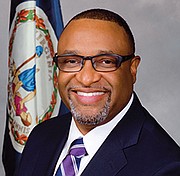Information blackout in new city ambulance permit case?
Jeremy M. Lazarus | 12/28/2018, 6 a.m.
The Richmond Ambulance Authority has, for now, avoided competition for non-emergency transports that help financially support its crucial emergency service.
City Council followed a committee recommendation in voting 9-0 on Dec. 17 to kill an ordinance sought by Mayor Levar M. Stoney to allow an Atlanta-based company to operate an ambulance service for non-emergency transports in the city and take business from the authority.
Mayor Stoney apparently was following the recommendation of Richmond Fire Chief Melvin Carter.
So far, Chief Carter has not provided an explanation to City Council or to the public for his recommendation to allow Western-Star Ambulance Authority’s operating arm, Metro Health EMS, to compete with the city’s ambulance authority.
Chief Carter, as well as City Attorney Allen L. Jackson and Chief Administrative Officer Selena Cuffee-Glenn, have not responded to a Dec. 7 request by the Free Press for the information.
The request, filed under the Freedom of Information Act, requested copies of documents issued by Chief Carter in support of his finding that a “public necessity” exists to allow Metro Health to operate ambulances in the city.
According to a city policy established 28 years ago under former City Manager Robert C. Bobb, city officials would have to determine that the ambulance authority was not providing a service to justify the “public necessity” finding.
Mr. Bobb put the policy in place in 1990 when the ambulance authority was established to centralize and upgrade emergency services in the city.
Metro Health, which has an office in Henrico County, filed for the permit based on its claim to have been awarded a contract to provide non-emergency patient transport to and from the McGuire Veterans’ Administration Hospital.
The VA has not issued any announcement of such an award, and the city ambulance authority continues to provide the service.
The authority estimated its non-emergency transport service brings in about $1.67 million a year in revenue that helps support its more expensive emergency service. VA payments represent about 37 percent of the nearly $5 million the authority earns annually from non-emergency transports, its financial reports show.
According to Chip Decker, chief executive officer of the ambulance authority, any reduction in the authority’s income from non-emergency transports would require the city to increase its annual subsidy to the authority “to ensure the residents of Richmond have proper and adequate emergency services.”
He estimated that if the ambulance authority lost the transport of VA hospital patients, the authority would need an additional $1.47 million from the city for emergency services. The city currently provides a $5 million subsidy annually to the ambulance authority to help pay for emergency care to city residents, at least 25 percent of whom cannot afford the cost.
Metro Health has sued the city in federal court in seeking to gain a permit to operate in the city, but so far the city has fended off the legal attack.
A federal judge rejected Metro Health’s request for a temporary injunction in early October to force the city to allow it to operate until its lawsuit is heard.
On Dec. 19, U.S. District Court Judge John A. Gibney Jr. lifted a temporary stay in the case following council’s vote and notified Metro Health that it has until Thursday, Jan. 3, to submit an amended lawsuit in pursuing its case.








